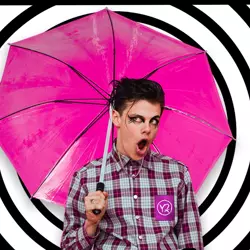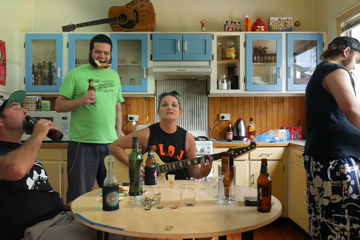 Yungblud
YungbludPlease note: this interview discusses mental health and anxiety.
Is Dominic "YUNGBLUD" Harrison the hip hop Billy Bragg? The Northern English singer-songwriter is shaking up the alt-rock scene with his blistering protest songs in the age of Brexit, Trump and political volatility. Indeed, on his debut album, 21st Century Liability, Harrison sings about everything from inequality to sexual consent to mental health issues. The rebel even tackles gun control in Machine Gun (Fuck The NRA) — which will undoubtedly prove contentious stateside, where he's currently on the Warped tour. "Of course it's gonna be mixed reviews, but you're not moving the needle if 50% of people aren't opposed to what you're saying," Harrison hollers down the line from St Louis. "I love being challenged, because I have such a strong opinion on the way it should be. So it's cool, man."
Raised in Doncaster, South Yorkshire, Harrison found the education system trying — partly due to his ADHD. Regardless, he latched onto music, scooping up a guitar as a toddler. At 16, he quit school and bounded to London. Though Harrison briefly studied art, he realised that music was his vocation. The multi-instrumentalist developed a bricolage of rock, punk, ska, hip hop and grime with socially conscious lyrics. In 2017, Harrison aired his first single, King Charles, attracting Geffen Records' A&R. But his break-out would be the poetic I Love You, Will You Marry Me — based on a true story of tragic romance, graffiti and gentrification in Park Hill, Sheffield. Last November, the triple j fave hit Australia for promo duties. Now he's bringing his infamously energetic band to Splendour In The Grass.
What did Harrison, 19, learn from making 21st Century Liability? "A lot about myself," he ponders. "For the first time in my life, I just feel like I'm not shouting into a black room — because I've got such a fucking close fanbase, who are such a community and almost very culty at the minute. I just feel like I'm having a conversation with my fans. It's kind of such a powerful connection with them. I feel like, for the first time in my life, I'm actually being listened to and I'm actually being heard — and that's so fucking exciting."
The album's most personal number is the stark Kill Somebody, in which Harrison chronicles his experiences with anxiety. "It's actually a song about me looking in the mirror. A lot of people are surprised by that. But the song talks about anxiety and wanting to kill the dark parts in my body that I hate. I think it's kinda great because mental health is finally being taken seriously. I just needed to write a song that showed the darker side of my personality because, yeah, I'm very happy all the time but, again, I suffer with anxiety. I just needed to write it and it needed to be on my first record so people could see the happy me and the opinionated me and the psyched me and the angry me, but also could see the vulnerable me as well."
Don't miss a beat with our FREE daily newsletter
Harrison addresses a wider alienation on 21st Century Liability. "I want this record to be an outlet for people who feel like they can't be themselves; who feel like their voice isn't important; who feel like it's been taken away from them. They feel like they're misunderstood because they don't conform to a box. It's ok to be yourself, say what you think, because that's how you change shit."
Yet, for all its sobering themes, the album ultimately radiates optimism. In interviews, Harrison often discusses solidarity, empowerment and new paradigms for activism. In fact, his own generation gives him hope with their desire for progress. And Harrison isn't a proselytiser so much as a reflector.
Still, striving for authenticity, Harrison admits that he doesn't get why some pop artists (oi, Taylor Swift!) refrain from political comment. "I just think everyone's afraid to be straight-up because of the repercussions. You put yourself out in the world today and you can be hated from 15 different angles if you open your mouth. People try and remain squeaky-clean and untouchable... [But] if you're not representing something, you're not an artist — you're a singer. And I don't wanna be a fucking singer!"
Harrison isn't purist. Intrigued by mods, he's cultivated a snappy image (complete with trademark pink socks). Moreover, Harrison's pop-punk songs have been used for Netflix's teen drama series 13 Reasons Why — the Brit cutting the Lil Peep-like duet Falling Skies with rising star Charlotte Lawrence, daughter of Scrubs producer Bill Lawrence. "Obviously there's a lot of controversy around the TV show, but personally I think it's amazing. I think it's doing exactly what art should do. As a person who suffers from anxiety, people feel [the show] can provide them with triggers and make them feel scared and uncomfortable — but, at the end of the day, yes, having anxiety is uncomfortable. But what's more uncomfortable is that some people don't understand the anxiety. People can't comprehend it. This TV show is gonna provide information to people who are totally naive to it and that can make people understand anxiety. It can make people understand what someone's going through in order to make them feel better, you know?"
If you or someone you know is in need of crisis support or suicide prevention assistance, please contact Lifeline on 13 11 14 or talk to one of their available crisis support staff. See their website for further details.















